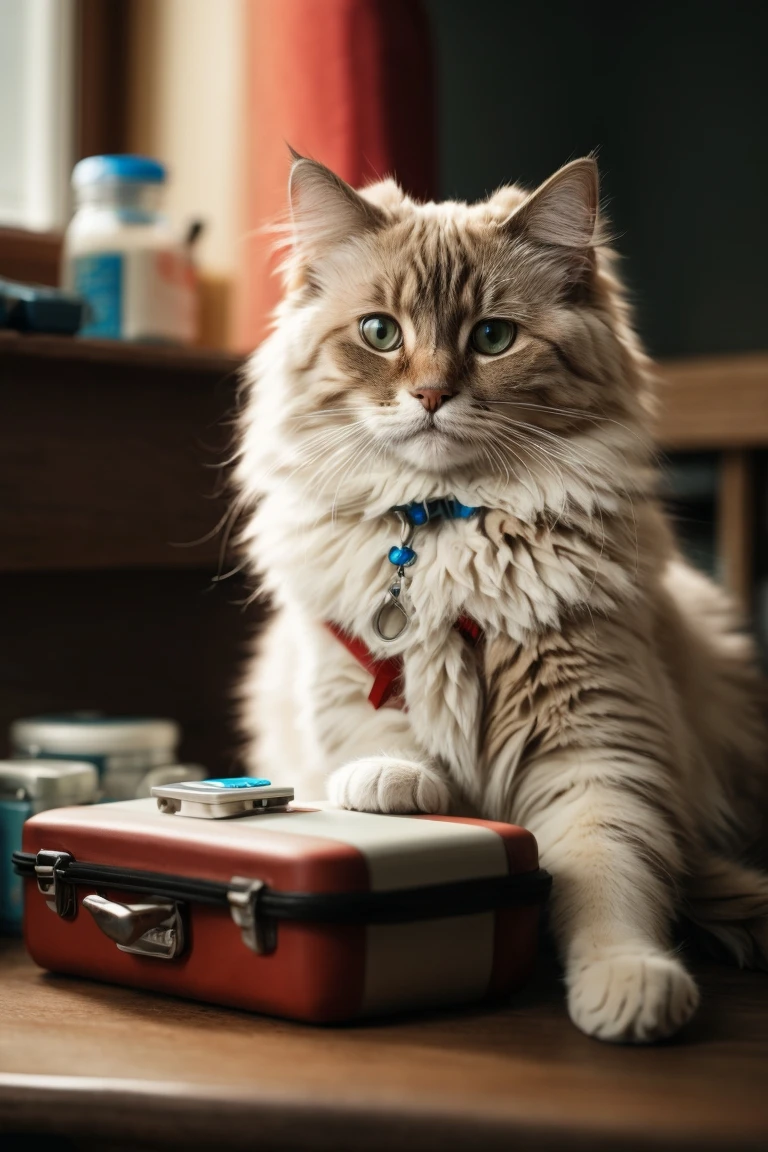How to Create a Feline First Aid Kit for Emergencies

Having key supplies on hand to treat injuries or illnesses is crucial for cat owners. This guide covers putting together a well-stocked feline first aid kit to prepare you for medical emergencies until veterinary care is available.
Essential First Aid Supplies
Keep these core items readily accessible in your cat first aid kit:
- Self-adhesive bandages - Protect minor wounds and absorb blood. Various sizes.
- Gauze pads - Apply pressure to wounds or use as a protective layer over bandages.
- Gauze roll - Wrap injured limbs or tails. Also good for muzzling.
- Medical tape - Secure gauze or bandages. Avoid standard duct tape.
- Antibiotic ointment - Reduce risk of infection in wounds when applied topically.
- Antiseptic wipes - Gently clean wounds to remove debris and bacteria.
- Q-tips - Help apply ointments or clean eyes, ears, or small wounds.
- Scissors - Trim fur around wounds or cut bandages. Use blunt tip safety scissors.
- Tweezers - Remove embedded objects like splinters, ticks, or foxtails.
- Thermometer - Monitor body temperature. Look for one designed specifically for pet use.
- Towels - Control bleeding, immobilize injuries, or keep a cat warm.
Additional First Aid Kit Items
Further items to include:
- Saline eye wash - Rinse irritants from eyes.
- Antibacterial soap - Clean wounds or skin irritations. Use a gentle soap formulated for pets.
- Activated charcoal - Absorb toxins ingested by mouth under vet guidance.
- Foil emergency blanket - Retains body heat if a cat is in shock.
- Instant cold pack - Apply to swelling. Avoid contact with skin.
- Fresh drinking water - Hydrate sick cats. Bring on car trips.
- Hydrogen peroxide - Induce vomiting of ingested poisons if advised by poison control or your vet.
- Pill syringe - Useful for oral medication administration.
- Pet first aid reference guide - Review how to safely handle common emergencies.
Logging Important Information
Include essential information such as:
- Your veterinarian's phone number
- Emergency clinic address/phone
- Poison control hotline number
- Medical records detailing vaccinations, medical conditions, medications, etc.
- Photocopy of cat ID, microchip info, adoption papers
- Your contact information in case your cat gets lost
Storing this vital data in your first aid kit keeps it easily accessible when needed most. Update as necessary.
First Aid for Common Cat Emergencies
Here is an overview of treating some frequent cat medical issues:
Minor Cuts and Abrasions
- Apply gentle pressure with a clean towel to stop bleeding.
- Flush the wound with saline solution or plain water.
- Pat dry and apply antibiotic ointment and a bandage.
Burns
- Immediately flush the area with cool (not cold) water for at least 5 minutes.
- Cover loosely with a sterile non-stick bandage or clean towel. Do not apply ointments/ice.
- Seek emergency vet assistance for severe burns. These can become life threatening.
Choking
- Clear airway by extending cat's neck and sweeping a finger inside their mouth to remove any obstruction.
- Look inside mouth for foreign objects. Never reach down their throat.
- If coughing continues, bring immediately to the vet to remove stuck objects.
Seizures
- Clear area around cat to avoid injury. Do not restrain or put anything in their mouth.
- Time the seizure. Call your vet if it lasts more than a few minutes.
- Comfort cat when the seizure ends. Restrict activity until fully recovered.
Overheating
- Bring cat into air conditioning. Place cool, wet towels on their neck and paws.
- Allow licking ice cubes or drinking cool water in small amounts if they can swallow.
- Get emergency assistance if cat's condition deteriorates - weakness, vomiting, diarrhea, seizures.
Knowing basic first aid keeps your cat stable until professional vet care is available. Familiarize yourself with these techniques before emergencies occur.
Car Travel First Aid Preparedness
Prepare a special kit to carry in your car in case of veterinary emergencies:
- Portable cat carrier secured with seatbelt
- Leash and collar/harness
- Blanket or towels
- Bottled water and collapsible food/treat bowl
- Cat litter, waste bags
- Gauze, tape, bandages
- Antibiotic and antihistamine ointments
- Emergency contact info and pet records
Having these items on trips prepares you to manage injuries or car accidents until you can reach medical assistance.
When to Seek Emergency Vet Care Immediately
In certain situations, home first aid is not enough. Get veterinary help right away if your cat has:
- Difficulty breathing or pale gum color
- Profuse bleeding that cannot be stopped
- Signs of shock - weakness, glazed eyes, rapid pulse
- Uncontrolled seizures lasting over 5 minutes
- Ingested poison or medication overdose
- Been hit by a car or experienced other trauma
- Collapsed, is nonresponsive or semi-comatose
- Sudden paralysis or inability to use limbs
- Choking that does not resolve after attempts to clear airway
Your feline first aid kit helps stabilize cats until the vet takes over for critical situations requiring urgent care. Knowing when to seek immediate help saves lives.
Key Takeaways for Feline First Aid Preparedness
In summary:
- Keep a well-stocked first aid kit easily accessible at home and in your car.
- Familiarize yourself with common cat emergency response - bleeding, choking, shock, etc.
- Log your vet, emergency clinic info, and cat's records in the kit for quick reference.
- Know when to manage incidents at home versus seeking urgent vet treatment.
- Practice first aid techniques before facing real emergencies.
- Replace expired items and update your kit regularly.
Preparing a cat first aid kit and learning how to use it gives you the ability to potentially save your cat's life in the event of an emergency until you can get professional veterinary care.